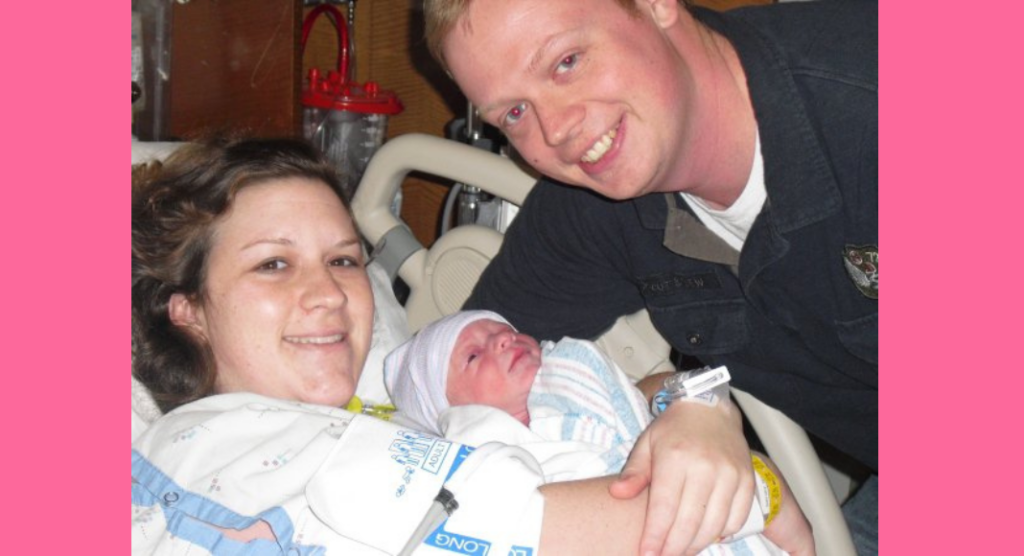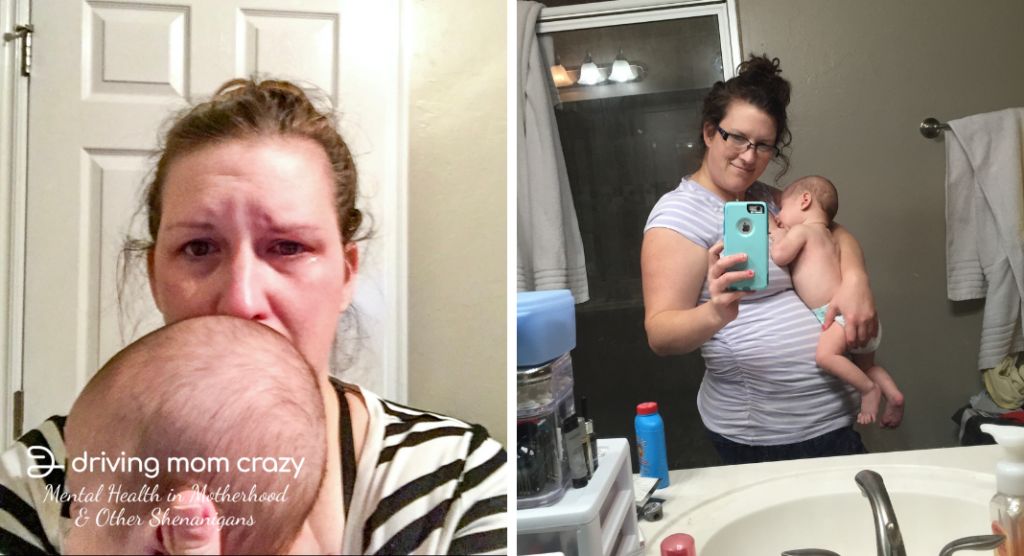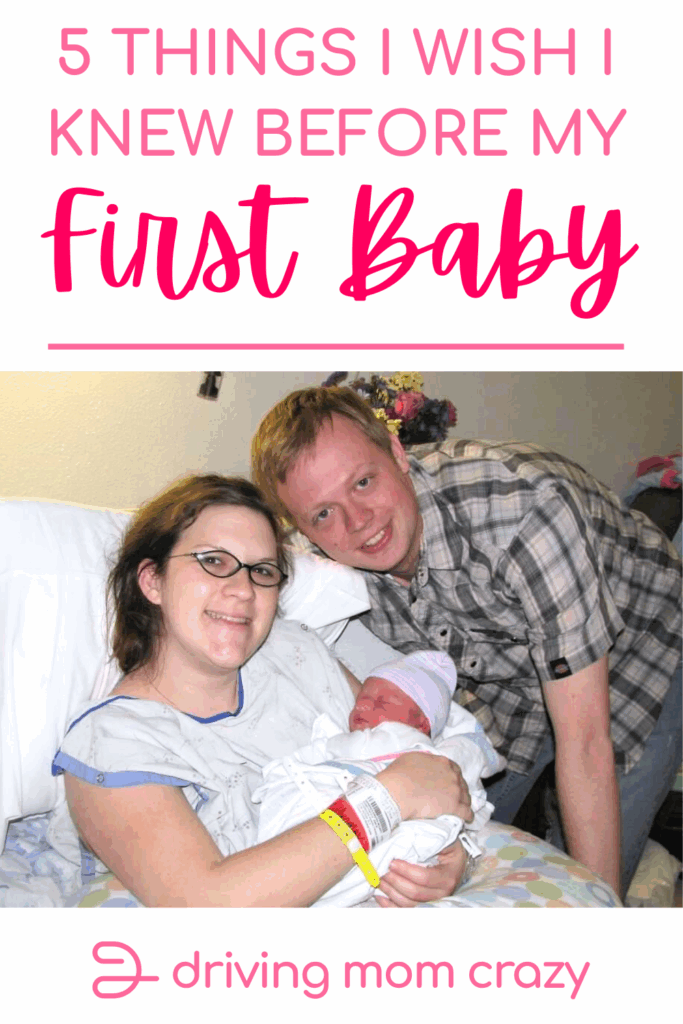This post is sponsored and contains affiliate links which means items purchased through these links return a small monetary percentage back to this blog. Read our full disclosure policy here.
There’s so much to think about when you’re getting ready to start a family. When I got pregnant with my first baby, I read all the books I could find about pregnancy and taking care of babies. I took birth classes. I thought I was really prepared, but later I realized there was a lot I hadn’t considered or been informed about. Now that I’ve had three kids and been through this a few times, I want to share a few of the things I wish I knew before my first baby so you can be more prepared than I was.
1. The epidural might not work
I put all my eggs in the epidural basket with my first birth. I didn’t know much at all about pain management. I just figured that it was a simple process; you’d get the drugs and be good to go. Each of my labors proved that to be wrong. My advice is to be prepared for everything! With my first, when I asked for the epidural the anesthesiologist was in surgery and couldn’t help me for over an hour. I had already waited until I couldn’t stand the pain anymore before asking for it, so after that felt like torture. With my second, the placement of the epidural wasn’t right and they had to take it out and redo it several times. With my third, I got the epidural with no problems, but it only made one of my legs numb and I felt every single ounce of pain for the entire birth. Read about my natural birth experience here.

2. You can get depression during pregnancy
I only had heard of post-partum depression before I started having kids. Partway during my first pregnancy, I started experiencing symptoms of fatigue, a low mood, lack of motivation, and sad and overwhelmed. I figured it was a part of being pregnant. In reality, I had perinatal depression and needed help to get through it. You can read about my experience here.
3. Get your car seat checked
Did you know 3 out of 4 car seats aren’t installed correctly? I used to be one of those! Over the years I’ve learned that there’s a lot more to using a car seat than meets the eye, so much so that there are nationally certified Child Passenger Safety Technicians (CPSTs) available to help you. I became certified in 2015 and love sharing my knowledge to help others. Find a local CPST to help educate you about your car seat well before you are due to give birth. The last thing you want to do is to be stuck leaving the hospital clueless and in pain, trying to get the car seat in correctly! Here‘s a roundup of a few of my best tips and hacks for car seats!
I’ve also saved this handy list of some of my favorite car seats here!
4. Breastfeeding doesn’t always go as planned
Breastfeeding was pretty easy with my first two babies. But with my third, I knew something wasn’t quite right. He wasn’t gaining weight and it was causing me an enormous amount of stress, so much so that I felt like I was going crazy. The pediatrician thought I wasn’t making enough milk or that it wasn’t nutritious enough and said the only solution was formula. While there’s nothing wrong with formula (I’ve used it a little bit with all three of my kids), I knew that he was just guessing and I felt confused and lost about where to go from there.
Luckily a friend of mine connected me with a lactation consultant who helped me understand what was really going on. He had a tongue tie. I was doing everything “right” and things were good on my end, but there was a problem with my baby. Had I not looked into it further, we would have continued to struggle and I would have continued to drive myself crazy, as there are other long-term effects from tongue ties. Regardless of how you choose to feed your baby, it’s vital to have the right information from knowledgeable providers. Read more about what happened after we discovered the tongue tie here.

5. Postpartum Body Changes and Care
There are quite a few things people don’t really talk about regarding the postpartum period. It’s often called the 4th trimester for good reason–it’s very much its own season that deserves special care and check-ins with your support system.
Physical Recovery Postpartum
The physical recovery was rougher than anticipated. This is partially because I had pre-eclampsia that came with a lot of swelling and low platelets, which meant that the post-partum bleeding was very intense and my pain level was pretty high, especially when sitting or walking. I thought this was what everyone’s normal experience was like, but after having two more children with much easier recoveries, I could tell a big difference. Sitting up to breastfeed was painful, so having extra pillows to sit on and a comfy setup at home is a must.

Everyone is different, so you really might not know what type of experience you’re going to have. Giving birth is an experience that might include unexpected circumstances, which means what you experience postpartum might be different than what you expect, too. Even with the best of deliveries, it’s still important to be prepared to take care of your post-partum body…especially the most sensitive parts.
The hospital will provide you with some supplies during your stay as well as a few things to take home, such as mesh undies, giant pads, witch hazel/tucks pads, a bottle to spray water after going to the bathroom, and Dermoplast. But it’s still important to be prepared for continued care at home, as the pain and bleeding can continue for weeks.
Postpartum Care Supplies
There are a few key items that can help make your postpartum experience MUCH easier. Here are a few of my go-to items:
- Frida Mom Postpartum Recovery Essentials Kit
- Frida Mom C-Section Recovery Must Have Kit, Postpartum Essentials
- Frida Mom Upside Down Peri Bottle for Postpartum Care
Mental and Emotional Postpartum Recovery
Your hormones will fluctuate which may leave you feeling sad, anxious, or just moody in general. Combined with a lack of sleep, at times I felt like I was going crazy. It’s important to have a plan for what you and your partner will do if you find that depression and anxiety are becoming overwhelming. Talk about it in advance with your OB/Gyn or other provider. It can also be a good idea to get established with a therapist during your pregnancy so that it’s easier to reach out postpartum and you won’t have to wait a long time for an appointment.

Postpartum Body Image
Body image can also be a struggle. After you give birth, you’ll feel a huge weight lifted from your belly, but you’ll still have a belly that might look like you’re still pregnant. That’s normal. It takes time for your uterus to shrink back down to its normal size…which can take a while. Don’t stress about fitting back into your regular clothes. I chose to continue wearing maternity clothes for a while. I ended up needing to buy new clothes because I never quite fit into my old ones ever again. My body was just shaped differently in the hips. It can be challenging to accept your new normal, but please know you’re not alone, and there’s no need to put pressure on yourself.
I hope these few nuggets of things I wish I knew before my first baby are helpful to you, but please know that in some ways, you’ll never be fully prepared AND THAT’S OKAY. Motherhood is a journey and you learn over time in your own way. Mothers aren’t just born; mothers are MADE as my friend Danielle wrote in her new book! You can check it out here.
Looking for more pregnancy and post-partum must-haves? Check out this roundup of THE BEST stuff I’ve found for postpartum care.
You Might Also Like:
- When Something Isn’t Right: Tongue Ties and Breastfeeding Problems
- Why Are Women So Tired?
- Easy Mother’s Day Gift Ideas
- Stop Using Mental Health Treatments as Insults
- Last Minute Easter Basket Ideas for Teens and Tweens




5 Comments